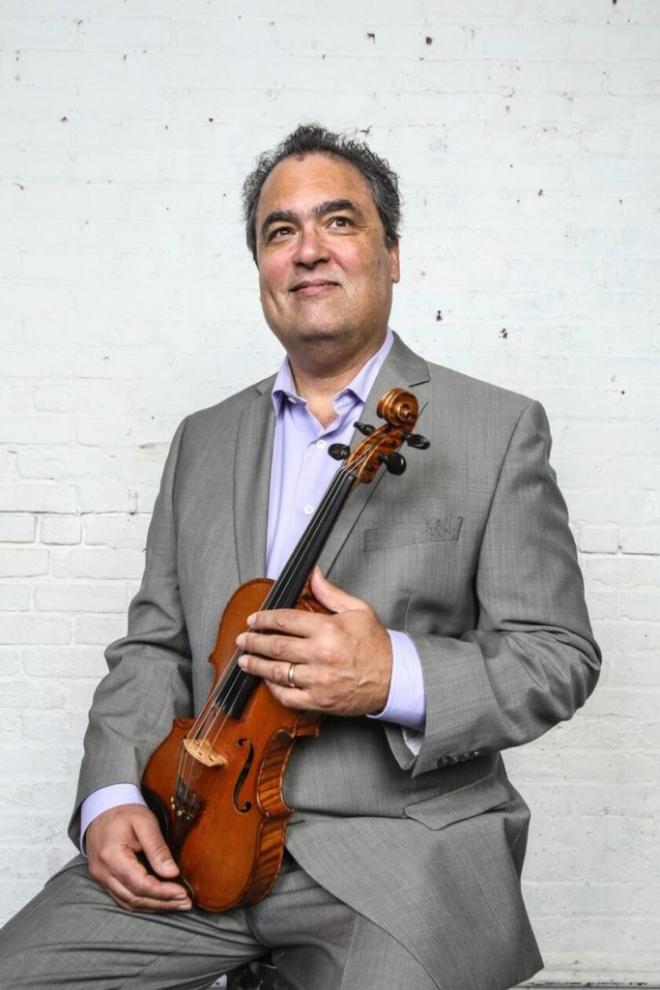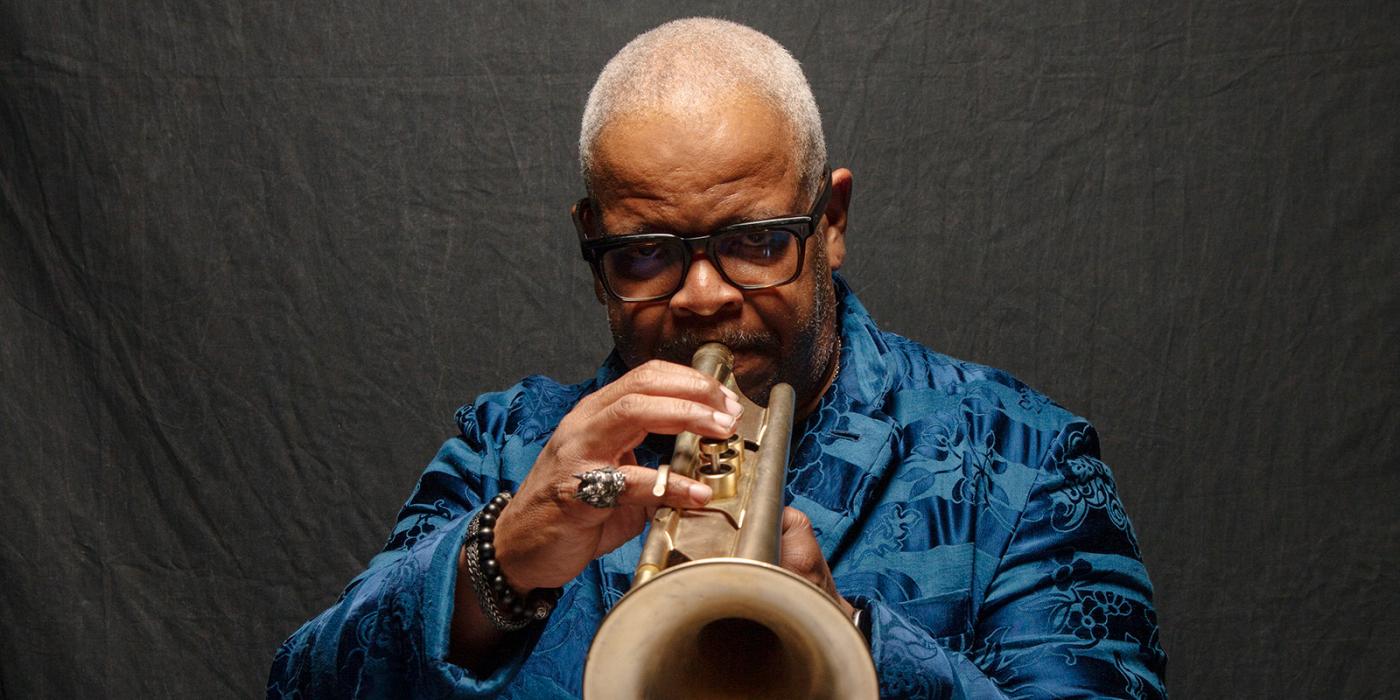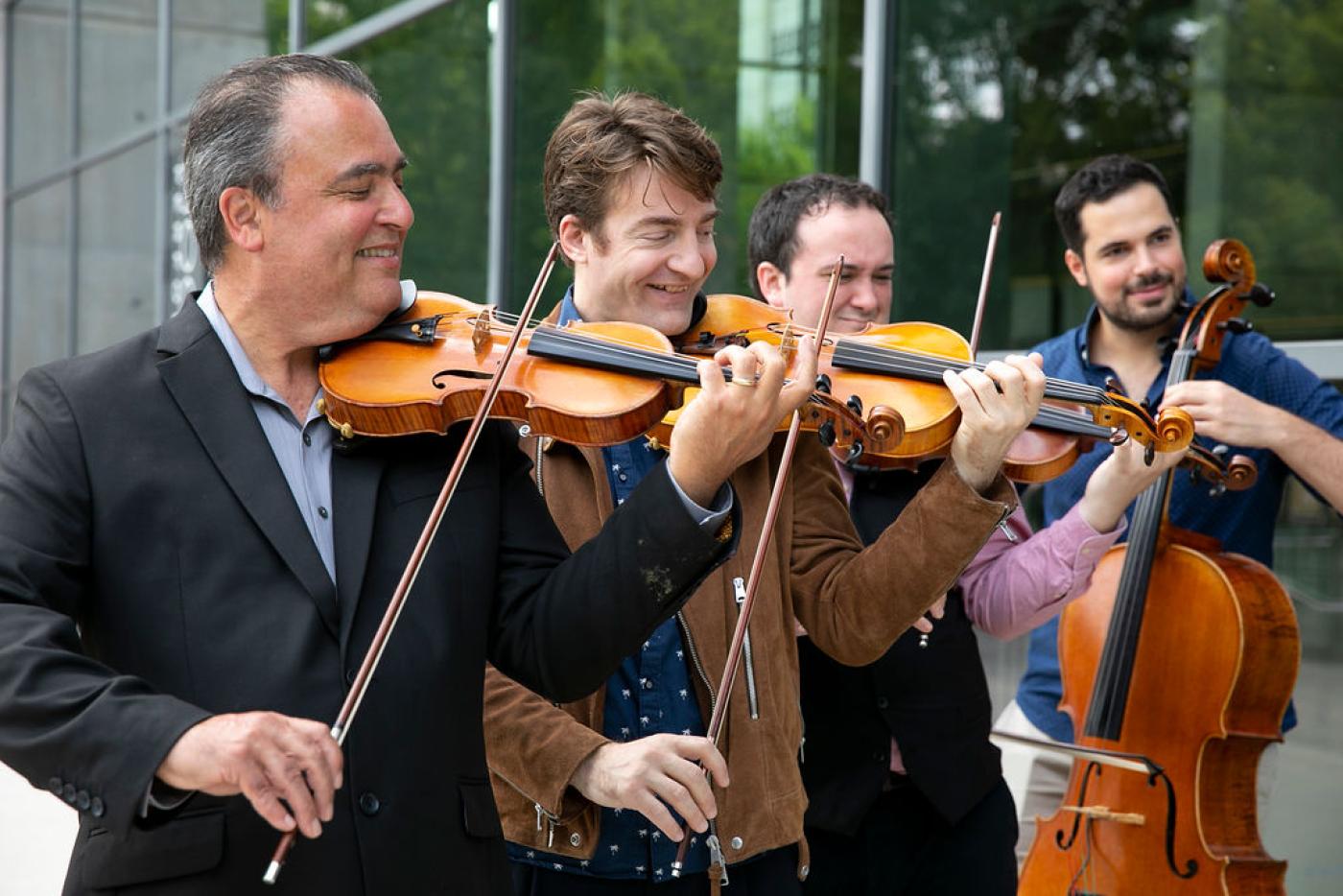I had the opportunity to ask violinist David Balakrishnan some questions about Fire Shut Up in My Bones: Opera Suite in Concert, a performance of music by Terence Blanchard on Friday, April 26 at the Music Center at Strathmore, and a co-production between Strathmore and Washington Performing Arts. This concert of music from Blanchard’s opera, with a libretto by Kasi Lemmons based on the memoir by New York Times columnist Charles M. Blow, features the E-Collective and the Turtle Island Quartet, and will include visual art by Andrew F. Scott.
Evan Keely: It’s not easy to think of a performer/arranger/composer better suited than yourself to this task of transforming Fire Shut Up in My Bones into a work for an intimate ensemble, given your lifelong commitment to new music and to music that crosses — we might say transcends — genre boundaries. Please tell us more about this project — what it means for you personally and for your Turtle Island Quartet colleagues, and what you hope audiences will experience.
DB: Thanks Evan, very sweet of you to say, and indeed I am blessed to have been given this opportunity. I love that you bring in the word ‘transcend’, which hits to the core of the cross-genre approach. At its best, it is a powerful tool for telling a good story, providing a rich palette of colors to draw from if you know how to blend properly and you have musicians who can deliver on the multi-stylistic elements. It’s what TIQ was built to do. Terence is a true master at this, as is well documented by his wide-ranging work across the board of the many music realms.
For me, Fire Shut Up in My Bones is a major musical and cultural statement of magnum opus proportions, and Terence asking me to do this put me into high gear looking to find a way to maintain the narrative in a forty-five-minute distillation of the original three-hour opera. Terence was gracious in allowing me to rearrange the sections he had asked me to include in such a way that the story ends in a different place, and Andrew Scott does a masterful job in visually magnifying this restatement. To say more would get in spoiler alert territory so will leave it there.
Another aspect I was shooting for, and the feedback from the band validates, is that this arrangement let us be ‘us’; TIQ, Terence and the E-Collective, in that there is space for us to put our stamp on the music with our sound that we have evolved working together these past two years. And the singers really love it, Terence talks a lot about how he found that opera singers often had a background in singing gospel music in church. Fire Shut Up in My Bones gives them a chance to delve into that side, plus in this setting they get a taste of being in a band so to speak.
On our end, we are equally inspired and enlivened by the experience. Opera singers are entirely different to play with than jazz or folk singers. Rhiannon Giddens explained to me that the feeling of gravity is different where the phrasing hits. Sitting so close and playing under and along, you really feel the power and emotive expressivity of their performance practice. It’s an eerie feeling, like an explosion in the chest. You can also sense that the audience is riveted. And that’s where the genius of Terence really shines forth, that he figured out how write for this form keeping his own sound esthetic intact and tell this amazing story.
EK: This isn’t your first collaboration with Terence Blanchard and the E-Collective: the TIQ played one of your compositions, “The Second Wave”, on Blanchard’s 2021 Blue Note album Absence. How did this experience inform your partnership on this Fire Shut Up in My Bones: Opera Suite in Concert project?
DB: As you might imagine, getting the call, in February 2020, to record with Terence and E-Collective, along with the implication that it possibly would be on Blue Note, and who knows what else to follow, was a thrilling moment. The thing about TIQ is, without seeing us play, it’s easy to miss the core impact of our style, given the inescapable stereotype of the string quartet — an aspect that both is a boon and a bane. Early in the process of tracking in the studio, though I assumed that Terence knew of us, I took the chance of asking him if we could play a piece of mine for him. We got two minutes into it and fell apart, which was upsetting to say the least. As it turned out, just from that, Terence got us. He moves fast, and suddenly, the piece was going on the CD, and from there, pandemic interruption notwithstanding, we started playing concerts together, the chemistry kept getting better and better and continues to grow.
For me personally, TIQ being my life’s work, it’s a dream come true to have someone of Terence’s level understand quickly and with clarity what we are about, and who is on the same channel albeit a higher platform. That he asked me to do this project was a big stamp of affirmation, because I could see he knew me and trusted me, maybe even at a deeper level than I did myself, and I didn’t have to try to be somebody I wasn’t. I could just be me and trust the musicians would find a way to pull it all together; we would do justice to his vision. But for sure it was a frightening experience in the first rehearsals, I will admit! Makes it all the more satisfying that it turned out to work so well.
EK: This whole question of musical genres is so complex and baffling and interesting to me. There’s a wider context to it — one might call it an extra-musical dimension — having to do with inclusion/exclusion, social power structures, and questions of human identity. Who gets to decide whose voice is heard, and whose may be left out? How do we determine what an art form is and/or isn’t? Élisabeth Jacquet de La Guerre’s Céphale et Procris had a few performances in Paris in 1694; Il Guarany by Brazilian composer Antônio Carlos Gomes was cheered by audiences at La Scala in 1870; American immigrant Victor Herbert enjoyed successes on Broadway like his Naughty Marietta in 1910; George Gershwin’s Porgy and Bess has been a standard since it first appeared in 1935: all of these very different works can be called “opera”. When Terence Blanchard’s Fire Shut Up in My Bones was first staged at the Metropolitan Opera in New York in 2021, it was the first work by an African-American composer to be presented at that venue — ever. What’s your take on the whole concept of genre and these questions of inclusion?
DB: It’s a daunting question. I can’t claim to be well versed in the wider aspects of the subject, especially historically. For me it has always been a simple matter from the standpoint of the music. I was a geeky kid, taking violin lessons, playing in junior high orchestra in the sixties, but I didn’t really resonate with classical music, I was obsessed with rock and roll, especially the guitar, à la Jimi Hendrix. Through messing around on my own along with the few rare examples of violinists in the rock field, I managed to find a way to adapt that to the violin. It was a rebellious thing, a rowdy screw you to my parents, the establishment, etc., and all the pressure that comes with the classical tradition, which especially in those days could be outright abusive.
Right away I could sense it was a great fit for me musically, since even though I would get a lot of criticism from my teachers on my classical playing, I was for sure a much better violinist than guitarist. Plus, it was unique, almost unprecedented back then to play rock violin. Most important, once the classical technique imperative was set aside, the violin turned out to be eminently suited to explore the phrasing style of rock guitar. Through that I acquired the basic skills that you need to improvise, that I could build on going forward.
Ironically, it was my rebelling from the oppressiveness I felt in the classical music scene that became my way to find inclusion. In college I came to reconnect with classical music, but more on the compositional side, where it seemed to me the action was creativity-wise.
Having subsequently spent much of my career championing the American jazz canon in the iconic European classical instrumentation of the string quartet, bemoaning the lack of cross genre skill in classical string players and the classical scene in general, and how that grievously limited the possibilities for composers and listeners alike, I didn’t glom onto the other side of the coin so to speak; that there was an easily perceivable lack of inclusion that needed to be addressed in the make-up of the classical music community itself, including the audience. As of late, especially witnessing first-hand Terence in action, I find myself putting my own stylistic sword down and considering the truth that I still have a lot to learn, and to unlearn as well.
EK: I appreciate that the TIQ has such a strong commitment to music of our time. You’ve performed and recorded works by composers like Rhiannon Giddens and Jerod Impichchaachaaha’ Tate. How are you hoping other musicians and ensembles will respond to the opportunity to elevate music of the here and now?
DB: My answer to the previous question notwithstanding, I am going to stick to my guns and continue to proselytize for western classical musicians, especially the classical string player community, to take very seriously the consequences of a lack of commensurate training and proficiency in improvisation-based genres. Especially jazz, which is often rightly considered America’s classical music, as well as the various other American vernacular traditions, and beyond that, the equally deep and from the western standpoint relatively unexplored territory of the classical and vernacular music traditions of the East. It’s how my own journey has manifested; as far as I can tell, there is a heck of a long way to go.
On a personal level that can seem overwhelming given more and more I feel the inevitability of this body’s impermanence. That said, I am blown away by how many ensembles nowadays are challenging, expanding, and redefining the parameters of ‘classical’ music, each in their own way. Our agency, EFPerformances (Terence’s agency as well), has worked hard to put together a classical division on their roster that beautifully reflects this esthetic. I will end with a nod to my fellow TIQ members, the ‘baby turtles.’ To me they seem miraculous, there are no limits there that I can see and thus I have faith my little corner of this wide and ever-expanding music universe is in good hands.
WETA Passport
Stream tens of thousands of hours of your PBS and local favorites with WETA Passport whenever and wherever you want. Catch up on a single episode or binge-watch full seasons before they air on TV.


